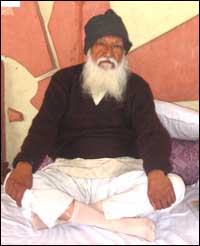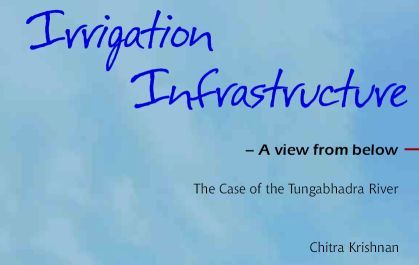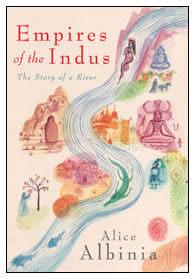Rivers
Book Review: Empires of the Indus
Posted on 29 Jan, 2009 10:56 AMEMPIRES OF THE INDUS : THE STORY OF A RIVER - by Alice Albinia
Pages: 366 ISBN-978-0-7195-6003-3 (978-0-7195-6004-0)
Format: hardback / trade paperback
Price: £20 / Rs. 550
Publisher: John Murray, U.K. Empires of the Indus is a comprehensive study of how the river Indus and its waterways have changed the history of the Indian sub-continent. Water is potent: it trickles through human dreams, permeates lives, dictates agriculture, religion and warfare. Ever since Homo sapiens first migrated out of Africa, the Indus has drawn thirsty conquerors to its banks. Some of the world's first cities were built here; India's earliest Sanskrit literature was written about the river; Islam's holy preachers wandered beside these waters. This perhaps captures the essence of this Guardian First Book 2008 awardee, Empires of the Indus , The Story of a River, by Alice Albinia.
Protesting broken promises: Dr. G.D. Agrawal resumes fast-unto-death
Posted on 20 Jan, 2009 12:19 PM
Images of a dying river, handwritten Press releases & more: Images of a Struggle on Flickr Charging the Government of India with not keeping its solemn commitment to keep the River Bhagirathi alive in its pristine stretch from Gangotri to Uttarkashi, Dr. G.D. Agrawal has resumed his fast-unto-death from Makar Sankranti Day, Wednesday, Jan 14, 2009.
You may recall that Prof. G. D Agrawal, former Professor & Dean of Students at IIT-Kanpur, the first Member-Secretary of India's Central PollutionControl Board and one of India's foremost environmental scientists went on a fast from June 13, 2008 to seek uninterrupted flow of River Bhagirathi (Ganga) in its natural form between Gangotri and Uttarkashi. His demand was very limited & specific, i.e., that the River Ganga be allowed to flow in its natural form in this 125 km stretch from its origin. This is the only stretch left now where the Ganga can still be seen in its pristine form. Dr. Agrawal requested the Govt. of India & the State Govt. of Uttarakhand to stop construction of Hydro Electric Projects (HEPs) in this stretch so that river flow was not diverted through tunnels that would destroy its ecology and its unique self-purifying properties. (diagrams are provided in the attached press release). Indians across the world got sensitized and lent their support to Prof Agrawal. Many wrote or met the PM of India and the CM of Uttarakhand and requested them to protect the Holy Ganga , whom Pandit Jawaharlal Nehru described as India's civilizational identity.
GOONJ's urgent appeal to provide for winters in the the flood affected districts of Bihar
Posted on 17 Jan, 2009 02:08 PMThis year we certainly need much larger quantities due to extensive work going on in flood affected areas of Bihar & Orissa. We are thankful to a large number of organizations & individuals who whole-heartedly supported our campaign Rahat Floods.
Press Release by SANDRP: Why does our Govt have no value for rivers ?
Posted on 08 Jan, 2009 10:32 AMA two day National Workshop on need for policy and legal norms for allowing freshwater flows in Rivers in India on January 3-4, 2009 at Bangalore ended with a unanimous demand that governments must allow continuous, sustained freshwater flows in all perennial rivers of India, whenever, a dam, diversion or hydropower project is planned, constructed or operated. Inaugurating the workshop on the morning of January 3, 2009, Shri L C Jain, former member, planning commission of India (and many other important posts), expressed his pain and anguish on the state of India's Rivers, "It is very disturbing that the acts of commissions and omissions of the authorities have ruthlessly, blindly, heartlessly lead todestruction of almost every major rivers of India. The hearts of the officials and ministers should throb for the millions depending for their needs and livelihoods on the rivers, but it seems that the stones of the South and North block buildings have entered their hearts." Quoting Gandhiji's agenda for the economic independence of India from what he wrote in the Young India on November 29, 1929, Jain said, Land, Water and Air cannot be subject of commerce, but the planners lock up the pain, hunger, malnutrition in the paragraphs of their five year plan documents and do not ensure their inclusion in their actual plans and programmes. He expressed his deep anguish that even the recommendations of the official policies and committees on ensuring freshwater flows in the rivers remain unimplemented.
Preliminary consolidated report on the effect of climate change on water resources, prepared by the Central Water Commission and the National Institute of Hydrology, under the guidance of the Ministry of Water Resources in 2008
Posted on 05 Jan, 2009 11:22 AMThe Preliminary Consolidated Report on the Effect of Climate Change on Water Resources, prepared by the Central Water Commission and the National Institute of Hydrology, under the guidance of the Ministry of Water Resources in 2008, is one of the first official reports made available by the Government of India, of a reliable quantitative assessment based on field data, of the likely effect of climate change on the availability of water resources, i.e. on the glaciers and snow melt, on rainfall and their effect on run off into the river system and their contribution to ground water. In the Report, an attempt has been made to give a brief account of the available studies on possible impacts of climate change on India's water resources, change in India's water needs, climate of India, river basins of the country, present water resources and future demand and supply, impacts of projected climate change and variability, and associated hydrological events and likely vulnerability of regional water resources to climate change. Identification of key risks, research needs and prioritisation of mitigation strategies has also been discussed. Access the report here: Preliminary Consolidated Report on the Effect of Climate Change on Water Resources
"Irrigation infrastructure - A view from below"
Posted on 27 Dec, 2008 03:52 AM "Irrigation Infrastructure - A View from below" is a new research study by Chitra Krishnan funded by the "Knowledge in Civil Society" initiative.
"Irrigation Infrastructure - A View from below" is a new research study by Chitra Krishnan funded by the "Knowledge in Civil Society" initiative.
Audio files: Bihar floods - The survival story
Posted on 17 Dec, 2008 07:44 PMFollowing is the summary of an interview of Anshu after he along with his team did their part in the rehabilitation processes. The summary narrates Anshu's experiences and evaluations on Bihar flood.
Kosi rehabilitation policy document from the Bihar Government
Posted on 15 Dec, 2008 11:05 AMThe document can be downloaded as a PDF here (Hindi): Kosi rehabilitation policy document
Kosi disaster: The rehabilitation & reconstruction policy
ReliefWeb's field report on the Bihar flood situation
Posted on 06 Dec, 2008 06:42 AMThe report starts from August as the floods struck and chronicles the sequence of events till November. The initial frenzy of the flood & confusion as people panic and relief exists as only a mirage to the slow grind of the government machinery are documented.
Book: 'Kosi - The deluge' a must read for all those interested in flood management
Posted on 25 Nov, 2008 06:18 AMThe book is a must-read for those who have some interest in Flood Management and especially in Kosi.
It is priced at Rs. 100/- and is available with
Fact Finding Mission






